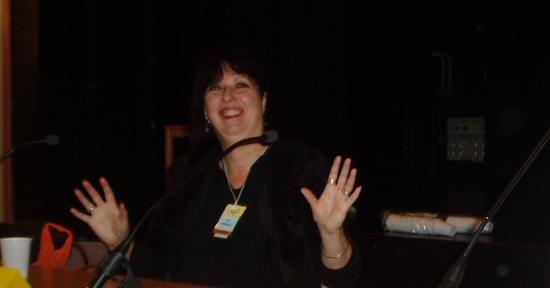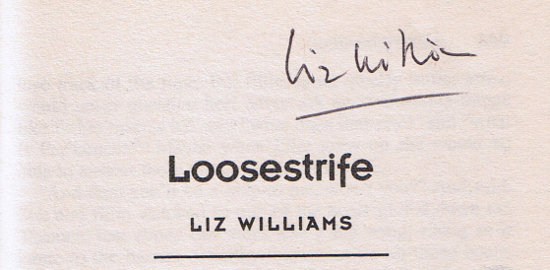| « Imagicon 2 report | Writing the alien » |
Liz Williams
Tags: Imagicon2 Liz Williams Me Science fiction
When you look at what the Earth has actually been through in terms of climate changes what we're doing to it is a minor blip; if you look at huge vulcanic eruptions, they are far worse than anything we could do to the ozone layer. This isn't to say that we should carry on going as we are going, or we'll end in disaster for us and for any species unfortunate enough to share the planet with us, but we're not going to damage the Earth particularly -- is's a planet.
Vestiges of empire, Interzone, May 2002 -- interview

The primary guest of honor at Imagicon 2 was Liz Willaism. In preparation to meeting her in real life, I've both read some of her short stories and an interview. At the con itself she participated in several panels, including an interview and a speach. In this I draw from all these sources.
Liz Williams grew up with the fact that you wrote books while doing your day job. So, she's taken an exam in knowledge theory (epistemology, a branch of philosophy), and today works in a store (selling supplies to witches), while she's had a traditional writer career: write short stories, have them rejected, get better and finally get in print. While she has a strict scientific education, she's also pagan, a well defined religion. She describes it this way: where New Age people believe in peace, love and light, a pagan has a more realistic and nuanced view of relationship with nature.
Among her short stories and novels there's both 100% SF, 95% SF ("Ikiryoh" uses the term good/evil, but is straight SF otherwise) and ghosts and other good stuff. She doesn't like categories, and she doesn't like to be put into categories. On the other hand she calls her own fiction "gothic fiction" overall. The style/language is always very important. Some topics show up regularly: the tension between relativ(istic) and absolut(istic), the failed wish to believe in something, and colonization.
The stories are written in the breaks -- i.e. while there's no one in the shop. A typical procedure is to start by drawing the map of the world, that will be pictured in the text. There's also research to do, and Liz does not believe in "write what you know" -- rather "learn something new, and then write about it". A lot of stories started with the knowledge she gained of the world by living so many different places. She also has a few other hints for writers. The message shouldn't be too loud. And it's important to separate "story", the emotional involvement, and plot, the logic that makes us believe the text logically.
As an example of these techniques she talked about the series showing detective Chen, in Singapore-III. Singapore-III is meant to be a franchise, where a new city gets to use some of the plan of Singapore, the name of the city etc. In real life it's also based on Hongkong, which she's visited. So she's heard about e.g. the real feng shui wars, where e.g. one bank wards off bad feng shui from another bank with mirrors, the other bank replies with mirrors of its own, and before you know the whole city is covered in mirrors, cars drive off the road and the mayor has to intervene. All this knowledge was gained from real life and used in fiction.

Created: 25 January, 2010 - Last changed: 25 January, 2010 - Comments (0)